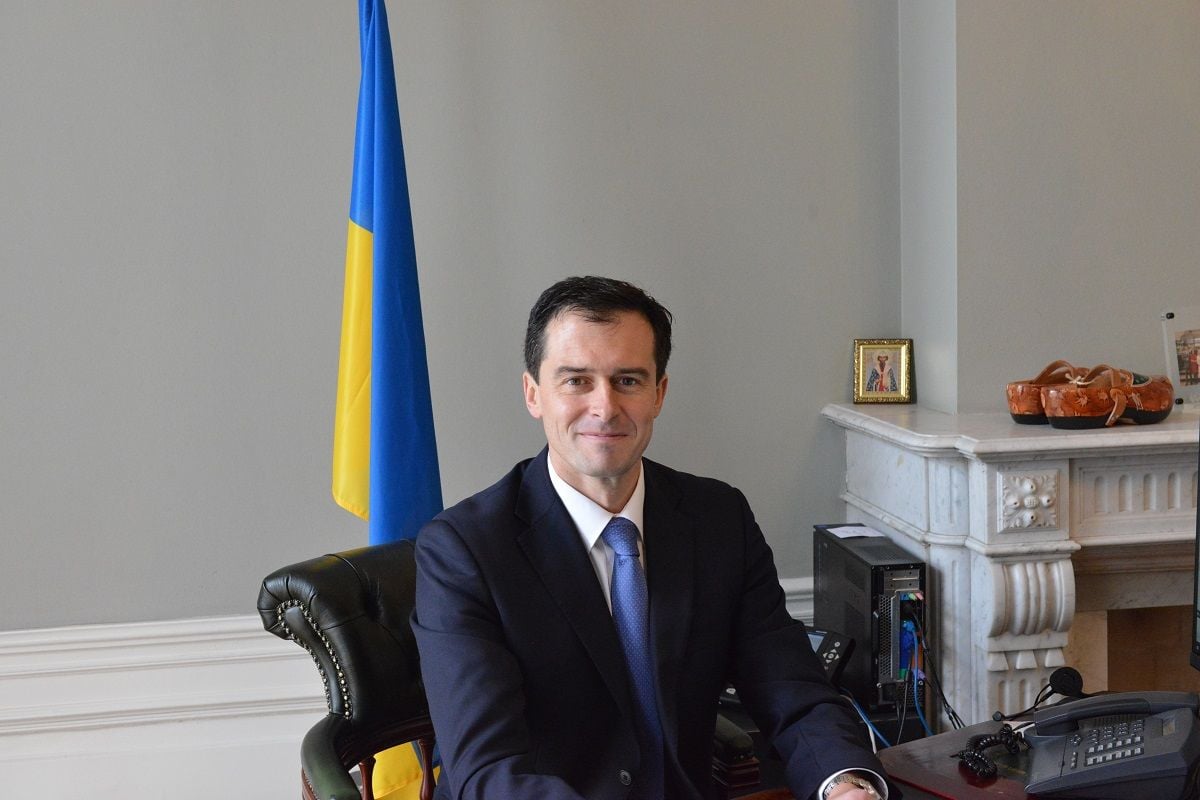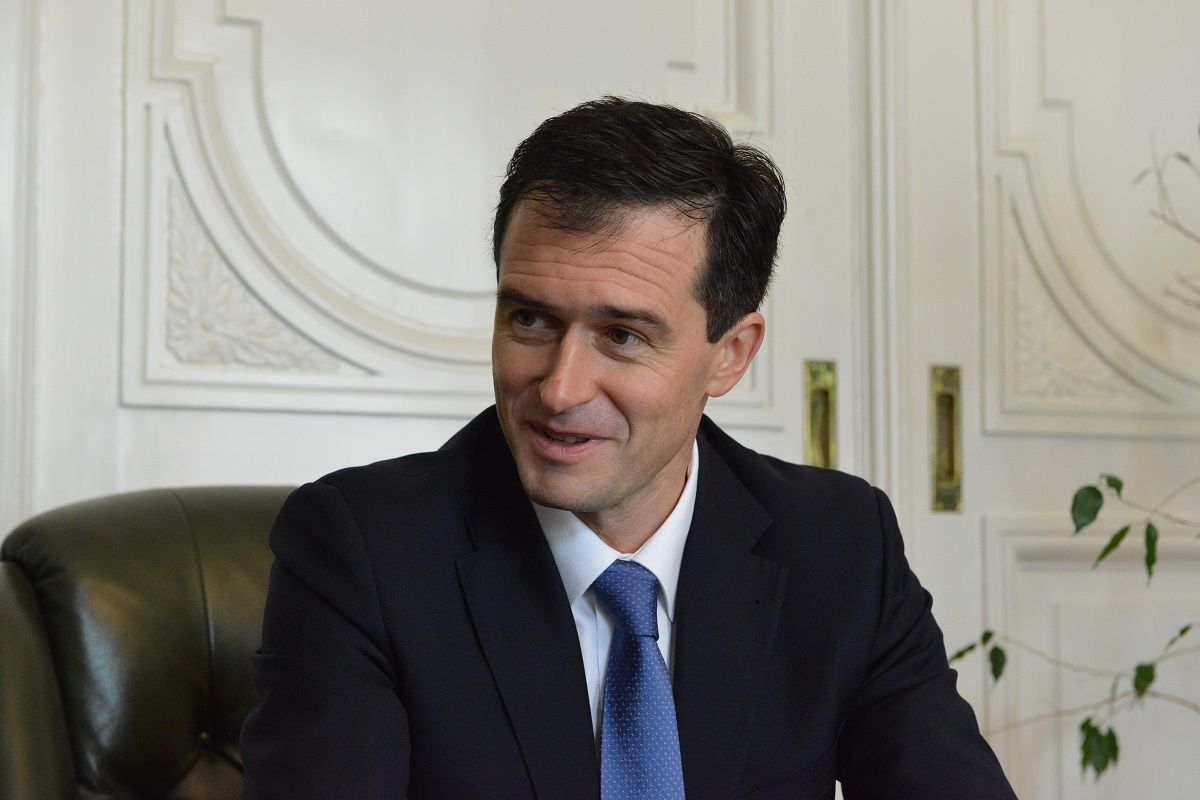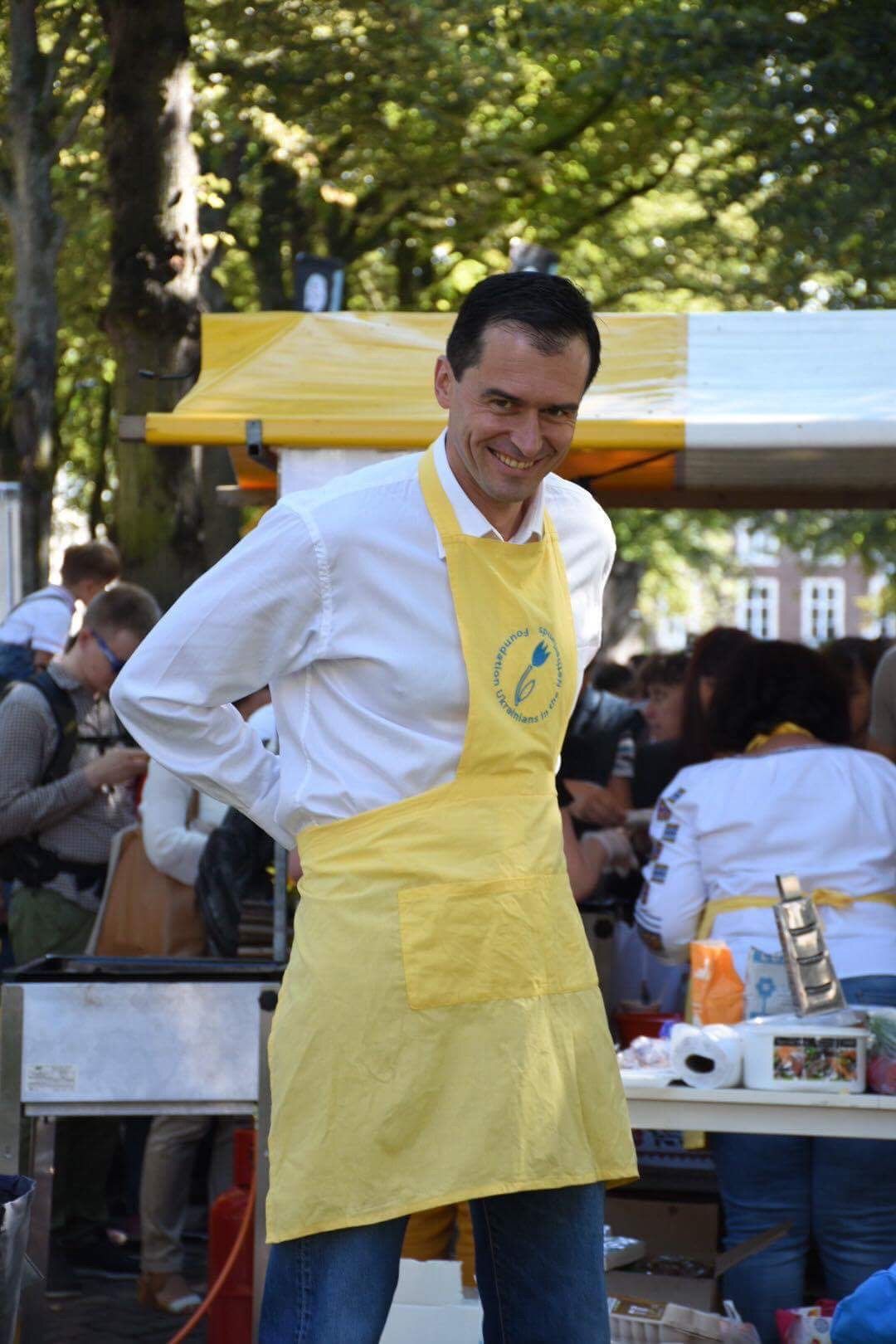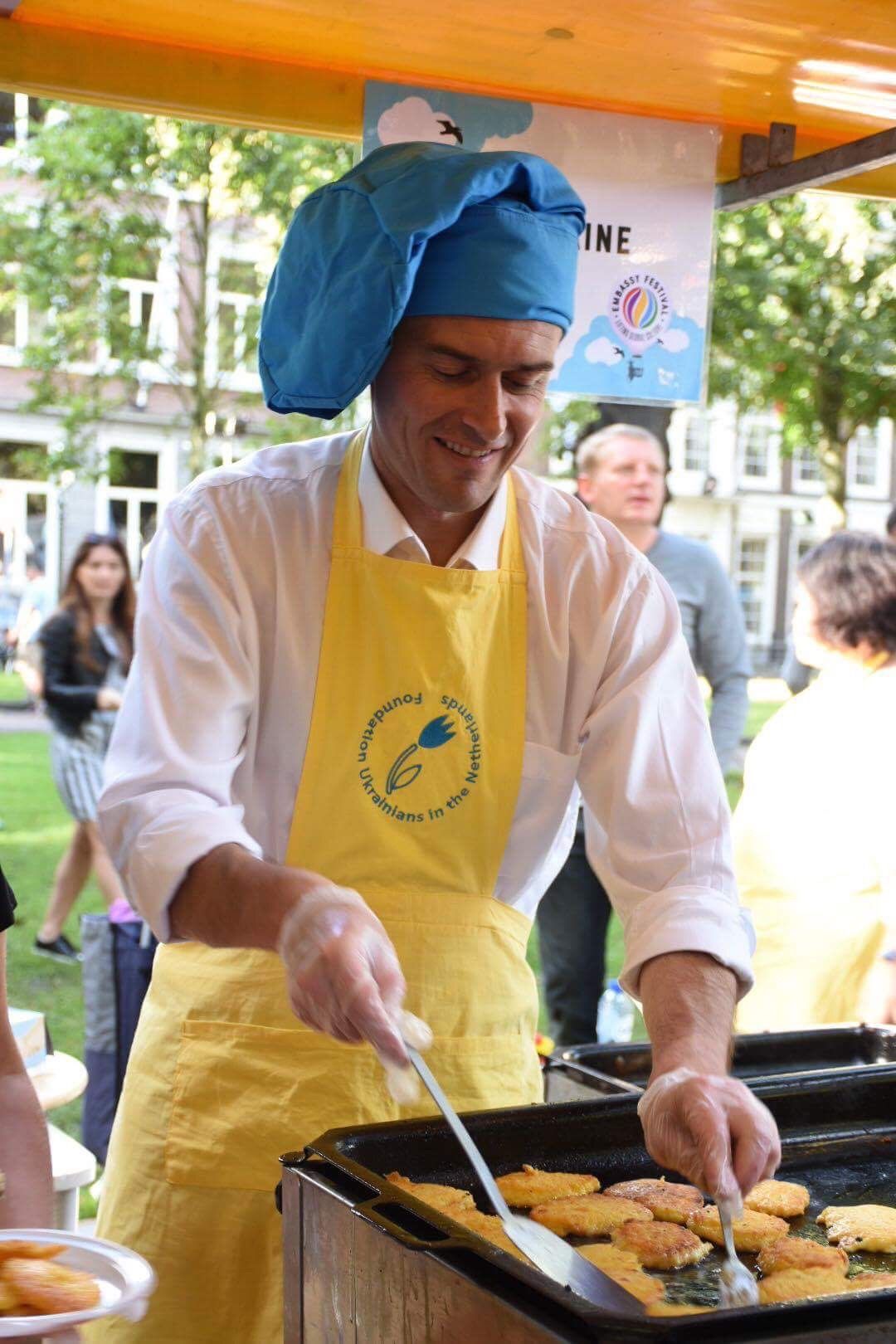
Ukraine’s Ambassador to the Netherlands: "The outcome of the referendum in the Netherlands showed that they knew little to nothing about us here, while the only things they know are of negative nature like corruption or Chornobyl"
The Ukrainian ambassador to the Netherlands, Vsevolod Chentsov, although appointed to the office just recently, is already aware, why the Netherlands did not want to (or could not) lay down the phrase about the recognition of Ukraine's European aspirations in the draft final declaration of the Ukraine-EU summit. In an interview with UNIAN, the Ambassador gave a sneak peek behind the diplomatic curtain.
Over the past few years, the Netherlands has taken a special stance in relations with Ukraine. It was the only European Union member state that could fail (there was a high chance it would do so) to ratify the Ukraine-EU Association Agreement, the U-turn from signing which by Viktor Yanukovych had initially sparked the Revolution of Dignity in November 2014. This is also a country that undermined the signing of the final declaration of the Ukraine-EU summit due to its unwillingness to recognize Kyiv’s European aspirations (it didn’t act alone, though), while agreeing to this phrasing in the draft declaration of the Eastern Partnership (EaP) summit.
The UN International Court of Justice (ICJ) in The Hague is already considering Ukraine's suit against Russia, the International Criminal Court is considering its jurisdiction over the case of the killings of Ukrainian soldiers in Ilovaisk, while the MH17 case is also being investigated in the Netherlands, and those responsible for the downing will also be tried in The Hague.
In these circumstances, quality efforts by the Ukrainian Embassy in the Netherlands play an important role. In June 2017, a new Ukrainian ambassador was appointed, a young and promising diplomat Vsevolod Chentsov, who from 2007 to 2011 worked as Ukraine's deputy representative to the EU, and then appointed a director of the EU Department of the Ukrainian Foreign Ministry. That is, not only he saw the EU’s diplomatic cookroom, he also knows well how it works from the inside. Chentsov takes a direct part in the hearings of Ukraine's suit to Russia in the UN International Court of Justice.
In his interview with UNIAN, he described how Ukraine is preparing for litigation with Russia, both within the ICJ and ICC framework. He also told the news agency, whether the Dutch stance toward Ukraine’s European aspirations is changing and what the reasons for this are. He also spoke about the things Ukrainians should learn from the Dutch.
How can you explain the position of the Netherlands and the Rutte government regarding the mentioning in the latest Ukraine-EU summit’s final declaration of the recognition of Ukraine’s European aspirations? Why was there such resistance, which resulted in non-signing of such declaration?
It is important to understand that this position is not at all directed against Ukraine. In this situation, we are working to ensure that the Dutch position on the future of the EU includes an element of the Bloc’s openness for the integration of European countries that are still not part of the EU.
Today, the question of the attitude toward the EU and its future shape remains the cornerstone of internal politics here, which can be easily described as: "The Netherlands expects that everyone around will respect its position." Naturally, taking into account the outcome of the referendum, as well as the decision that the Dutch government was able to find and agree in order for the Association Agreement to enter into force, the Prime Minister Mark Rutte’s maneuvering space was essentially limited. Just recall the background of negotiations on the draft declaration: after the parliamentary elections that took place in April, the coalition was never formed, while the government was essentially of a transitional nature, and the issue of changes to the law on referendum became an important factor in coalition talks. In my opinion, it was extremely important for the prime minister to remain consistent in his position.

In addition, it should be assumed that it was important for the government not to give an opportunity to nationalist ultra-right forces to exploit this argument in their populist rhetoric. It's no secret that parties of this kind are gaining more weight, not only in the Netherlands but also in other EU countries. Just look at what’s happening in Germany.
How long will this factor play its role in domestic politics?
I think that the situation will prevail until there is a restart within the EU itself, and until these issues cease to be as acute as they are today.
In that case, what has changed now? After all, the Netherlands agreed to lay down in the draft declaration, now being prepared for the EaP summit, the notion about Ukraine’s European perspectives…
Let's go step by step. Negotiations on this document are still ongoing, that’s one thing. Secondly, plenty of work has been done both in Brussels and here, in The Hague, as well as in other European capitals, at different levels, including top leadership. The fact that after six months (!) of negotiations the process of forming a coalition in the Netherlands has finally been completed also played its role. It is important to note that the parties that had formed it have reached an agreement on the need to revise the law on the referendum. It is still unclear, what amendments will be made but, most likely, they will be directed at withdrawing international treaties from under this law’s jurisdiction.
Thirdly, the fact that the provisions of the EaP summit declaration also concern other partner countries besides Ukraine opens up additional negotiating opportunities. And the last thing which is probably most important is that both in the Netherlands and in other EU member states, awareness is gradually shaping up of the enormous moral and psychological significance for Ukrainians of "open doors to the EU". They start to realize that under no circumstances can we lower the bar of our ambitions laid down in the Association Agreement, given the events of the past three and a half years. That is, we are moving to the fact that our idea, the recognition that the EU is open to European states that are not members of the Bloc, is now shaping up.
So was there a hustle around the words "acknowledge" and "recognize" in the draft declaration of the summit? For us, it's actually, all the same both words are translated equally [“vyznavaty” in Ukrainian stays for both “acknowledge” and “recognize”]...
I have to reiterate the fact that consultations on the text are still going on, including with regard to linguistic features. At the same time, in my opinion, if we are talking about the Eastern Partnership, it is of fundamental importance to not get carried away with the "game of words" but rather to reach a compromise. This compromise must not only fix a mutually acceptable phrasing on the prospects for relations but also answer the question on how the principle of differentiation may be implemented in the medium term, what will the specifics of EU relations be with the three countries that have concluded association agreements – that is, Ukraine, Moldova and Georgia - and at the same time, what could the common agenda of relations with the EU be for all six partner states.
As for the MH17 investigation, do you know, at what stage it is now? Does the embassy remain in contact with the Joint Investigation Team (JIT)?
The embassy is actively engaged with the Ministry of Foreign Affairs of the Netherlands and other agencies involved. After all, we are talking not only about the investigation of the crime as such, but also about ensuring, or rather, creating the necessary legal and structural framework to provide for due prosecution. In this issue, five countries are involved (Ukraine, the Netherlands, Malaysia, Belgium, and Australia). That is, it’s about concluding relevant bilateral and multilateral documents, attracting experts and the like.
As for the efforts by the JIT, we have close and direct interaction at the level of law enforcement agencies of our states. The investigation is ongoing and, accordingly, any information regarding the persons to be charged remains confidential. The information on the date when the trial will start is not being disclosed, either. At the same time, given the extreme public importance of the issue, there is no intention to delay the investigation. The main task is to collect enough evidence to prove in the framework of the criminal process the guilt of those responsible.
Concerning the issue of consideration by the ICJ of the Ukrainian lawsuit against Russia, at what stage are now Ukraine’s efforts on preparing a memorandum with the evidence of Russia's crimes, which is due to be submitted by June 12, 2018?
This memorandum is one of the most important documents in the litigation. It will represent the Ukrainian position on the substance of violations by the Russian Federation of its obligations under the International Convention for the Suppression of the Financing of Terrorism and the International Convention on the Elimination of All Forms of Racial Discrimination. We have enough material evidence that can be submitted to the court. Nevertheless, much still needs to be done for the careful selection of evidence, their systematization, and quality presentation. Therefore, this rather long period of preparation is filled with intensive efforts.
If Russia submits its counter-memorandum before July 2019, does this mean that a consideration of the case on the merits can be launched only after this happens?
After we submit our memo, Russia will have 13 months to respond and prepare its own. We are ready for any scenarios and calculate all possible options. In any case, the consideration of the case on the merits will correspond to the overall dynamics of the proceedings in the Court. Given the complexity of the dispute, the study of written material before the final decision is handed down could take a considerable time.
In its ruling on preliminary measures in this claim, the ICJ pointed out that Russia should refrain from limiting the ability of Crimean Tatars to retain their institutions, including the Mejlis, and to guarantee the accessibility of education with the Ukrainian language of instruction. However, it is obvious to all of this is not being fulfilled. Is the implementation of the Court's orders being monitored? Is there a need to raise the question of the use of coercive mechanisms?
We are closely monitoring the situation, but it is complicated by the fact that neither Ukrainian authorities nor specialized international structures have access to the occupied territories. The Russian side ignores both the ICJ ruling and the appeals of the UN High Commissioner for Human Rights. And this is one of the factors that seriously compromises one of the UN’s founding states. Now Ukraine, in coordination with a number of partner countries, is promoting the draft of the new UN Resolution on the Situation of human rights in the temporarily occupied Autonomous Republic of Crimea and the city of Sevastopol (Ukraine), which will document the existing violations, and we will demand that the Russian side observe its obligations as an occupying state, in accordance with international law, including the full implementation of the ICJ ruling.
Returning to other cases heard in The Hague, has the ICC opened the case of the killings of Ukrainian military in Ilovaisk?
The ICC procedure is somewhat different from the national investigation procedure. Officially, the ICC’s Office of the Prosecutor (OTP) has launched a procedure for the preliminary study of the situation in Ukraine. At this stage, the situation in Ukraine is being analyzed in order to establish whether there are signs of possible crimes falling within the ICJ jurisdiction in accordance with the Rome Statute.
At this stage, the Prosecutor does not collect evidence independently, but uses information obtained from reliable accessible sources, such as individuals, organizations, and state agents. Now the OTP’s analysis of the situation in Ukraine is at the stage of establishing the ICC's jurisdiction over the events that took place or are taking place in Ukraine.
The annual report of the ICC OTP provides an assessment of the progress in analyzing the situation in Ukraine. In the 2016 report, the OTP tentatively concluded that there is an international armed conflict between Ukraine and Russia regarding Crimea and the east of Ukraine, and that there is also an actual occupation by the Russian Federation of Crimea and Sevastopol.
Now the OTP should establish the extent to which Russia supports the armed separatist groups in the east of Ukraine. It is about the supply of weapons, equipment, financing, personnel, assistance in or instructions for planning the actions of such groups. All of this will be evidence of actual control over them by the Kremlin. If it is concluded that the information available is sufficient to initiate an official investigation, the Prosecutor will apply to the ICC's Pre-Trial Chamber for permission to authorize it.
The court has jurisdiction over crimes committed in the territory of a State which is party to the Rome Statute or a State that has recognized its jurisdiction based on a declaration (that’s what Ukraine has done), regardless of the nationality of the persons who committed it, even if they are nationals of the State, which is not a party to the Rome Statute. Thus, it is quite probable that citizens of other states can be brought to justice for war crimes and crimes against humanity committed in the territory of Ukraine after November 21, 2013.
Incidentally, I would like to note that, since Ukraine has not ratified the Rome Statute but has recognized the jurisdiction of the ICC, the decision-making process to start the trial will be rather complicated. After the completion of the study stage, even if the Prosecutor concludes that there are grounds for initiating an investigation, it’s the ICC Pre-Trial Chamber which will take the corresponding decision. At the same time, the state that is a party to the Rome Statute has the right to initiate the launch of the investigation, and the decision of the Pre-Trial Chamber is not required in this case. If Ukraine ratifies the Rome Statute, it will expand the procedural capabilities of our state. Simply put, after such ratification, the ICC Prosecutor would be able to decide to initiate an investigation based on Ukraine's appeal. Taking into account the amendments to the Constitution of Ukraine passed in 2016, allowing ratification of the Rome Statute, the efforts to prepare for ratification and adopt relevant changes in the legislation should begin as early as today.
At what stage is now the consideration by the Permanent Court of Arbitration of the claim by Naftogaz of Ukraine against Russia over the seizure in 2014 of the company's assets in Crimea?
This is not only about Naftogaz of Ukraine. Claims for damages caused by the illegal seizure of assets by Russia have been filed by another six companies that are part of the Naftogaz group - PJSC Chornomornaftogaz, PJSC Ukrtransgaz, State Enterprise Likvo, PJSC Ukrgazvydobuvannia, PJSC Ukrtransnafta, and SC Gas of Ukraine. Experts estimate this group’s losses at about $5 billion. We expect that the Arbitration will hand down its verdicts before the end of 2018. Now the Arbitration is to establish the procedural terms for further consideration of the claim. In this case, just as regards human rights in Crimea, our logic is that the Russian Federation, as an occupying state, is obliged to respect the rights and legitimate interests of individuals and legal entities on the peninsula, including regarding their assets.

Does Ukraine have enough evidence to submit to the Permanent Court of Arbitration before February 19, 2018 a memorandum, which will set out the facts relating to Ukraine’s lawsuit on Russia's violation of the UN Convention on the Law of the Sea?
We initially had enough evidence. The issue at this stage is not so much about searching for new evidence, but about a careful structuring of logic, alignment of facts and legal instruments. As with the ICJ case, the memorandum will be a key document which will be the base for the subsequent work of the Arbitration.
What tasks do you set for yourself as the Ambassador of Ukraine to the Netherlands? What prospects arise with the formation of a new government in this country?
To answer this question, you must first answer another one: who are the Dutch? What kind of nation is this? From what I have already learned, the keywords that I would use to characterize this country are "trade", "hard work" and "freedom of spirit".
I don’t want to seem boring; besides, people don’t like longreads these days; however, I should say this... The Netherlands is Europe’s largest exporter of agricultural products. World’s second, in fact. The first is the U.S. At the same time, the country’s size is less than that of the two regions of Ukraine, for example, Zhytomyr and Vinnytsia regions. There’s also Europe’s third largest airport in Europe here, Schiphol. The largest one is Heathrow in the UK, the second largest is Charles de Gaulle in France. Some 20% of the country's territory consists of land reclaimed from the sea due to dunes, dams, and hydraulic structures. Had it not been for the dams, there would have been neither Amsterdam nor Rotterdam. They even have a saying: "God created the world but the Dutch created the Netherlands." That’s the kind of a nation we are dealing with. We do have much to learn from them. And we already are.
This is one of the embassy’s tasks: to help Ukrainians implement the Dutch experience. I will give just one example, although it is not about trade, but about a human approach to families where a child with serious health problems. After all, we have all those clinics and hospitals where families from time to time take their kids with health problems and receive some kind of help; there are also some periodic medical examinations taking place. Basically, this is the problem the families address themselves. They face their problems one-on-one, while many actually give up on their children, especially if their cases are too serious. And their cases very often become serious because no necessary assistance has been provided at the early stages, so the problem got worse. In the Netherlands, there is a systemic approach at early stages, and medical specialists work in families and with families – they visit them almost a few times a week, train parents how and what to do, and remain in constant contact. This is called "early intervention". And now, the Ukrainians, who once moved to the Netherlands, got engaged on this issue and began to adopt the experience and create pilot projects in Ukraine together with the Dutch organization "Soft Tulip". Such projects are already being implemented in Kharkiv and several others cities across Ukraine. They want to change the system at the national level, and we support their efforts.
In the field of economics, we are trying, on the one hand, to develop the areas that are already working, and on the other - to seek new solutions. As an example, I will address the agricultural sector. Last year, the Netherlands rushed into the world’s TOP5 exporters of our agricultural products with a yearly volume of some $700 million. But we can significantly increase these volumes by combining our assets - Ukrainian fertile land and human resources - with the Dutch technology and investment. I would like our people to be able to work legally and be paid decently to work in greenhouses across Ukraine built on Dutch technology, instead of seeking bigger wages in a foreign land, facing many other problems. In early December, in Rotterdam, under the auspices of the Ukraine-Netherlands Business Council, headed from the Ukrainian side by our former Minister of Agrarian Policy Oleksiy Pavlenko, and from the Dutch – by Hans de Boer, President of the Confederation of the Netherlands Business and Employers, together with Rotterdam Partners and the Ukrainian Investment and Trade Facilitation Center (ITFC), we will hold a thematic conference on innovations in agriculture and logistics.
There are a lot of things to learn from the Dutch in water management, waste management, in the field of transport and logistics. I repeat, my main task is to build new things on the foundation created by my predecessors, Ukrainian and Dutch diplomats, using new opportunities and tools, especially those envisaged by the Ukraine-EU Association Agreement.

As for the new government, in my opinion, important for the development of our relations, in the context of the implementation of the Association Agreement are the provisions of the program of Rutte’s Cabinet related to the additional attention given to the development of external trade and economic relations. Both Foreign Minister Halbe Zijlstra and Minister of Foreign Trade and Development Cooperation Sigrid Kaag have great experience in this field.
And what do the Dutch know about Ukraine?
The outcome of the referendum in the Netherlands showed that they knew little to nothing about us here, while the only things they know are of negative nature like corruption or Chornobyl. At the same time, the positive thing about the referendum was that people learned more about us. They began to take an interest. That is, the problem with the referendum was converted into an opportunity to tell these people more about Ukraine. Now, this interest should be supported.
I set the task before myself to ultimately support the interest toward our country from young Dutch and local businesses so that this "Ukraine" drive remains despite the difficulties that arise. Our artists started to tour this country. For example, on November 1, Onuka performs in The Hague (I take this opportunity to invite everyone to the show). Two weeks ago, Vopli Vidopliassova band performed. Undoubtedly, the majority of those attending the gigs are our fellow citizens living here permanently or temporarily. But more and more Dutch people are coming to such shows. Several Dutch people signed up to learn the Ukrainian language at the Ukrainian school in The Hague. Interestingly, they are all adults! Thus, it is important that we gradually join the information and cultural environment as a normal country, which has things to show, as a country that is able to produce a high-quality cultural product and whose language is interesting and useful to learn.
Iryna Somer

